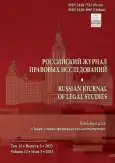Достижение истины в уголовном судопроизводстве как критерий ретроактивности норм процессуального законодательства
- Авторы: Запотылько П.С.1
-
Учреждения:
- Институт законодательства и сравнительного правоведения при Правительстве Российской Федерации
- Выпуск: Том 12, № 3 (2025)
- Страницы: 73-80
- Раздел: Уголовно-правовые науки
- URL: https://journal-vniispk.ru/2410-7522/article/view/339636
- DOI: https://doi.org/10.17816/RJLS690120
- EDN: https://elibrary.ru/TVWWAG
- ID: 339636
Цитировать
Аннотация
В статье исследуется проблематика сопряжения ретроактивного действия норм процессуального законодательства с объективной или формальной истиной в рамках уголовно-процессуальных правоотношений. В условиях все возрастающей динамики внесения изменений в законодательный массив проблема действия уголовно-процессуальных норм во времени представляет особую актуальность. Несмотря на существование общего правила о немедленном действии уголовно-процессуального закона, вопрос о придании ему обратной силы остается дискуссионным. На основе анализа отечественных источников права, правоприменительной практики и позиций доктрины делается вывод, что решение вопроса о ретроактивности норм напрямую зависит от момента производства по уголовному делу. Согласно представленному тезису была разработана классификация, разделяющая обратную силу процессуального закона на два вида: имманентную (применяемую до вступления судебного решения в законную силу) и трансцендентную (действующую на стадиях кассационного и надзорного обжалования). В статье доказывается, что применение имманентной ретроактивности является допустимым вне зависимости от того, какая концепция истины (объективная или формальная) принята в качестве задачи уголовного судопроизводства, при условии соблюдения конституционного принципа о недопустимости обратной силы закона, ухудшающего положение граждан. В то же время возможность применения трансцендентной ретроактивности ставится в прямую зависимость от признания объективной истины задачей судопроизводства. Если же процесс нацелен лишь на достижение формальной истины, то после вступления решения суда в силу основания для пересмотра дела в свете нового закона отсутствуют.
Полный текст
Открыть статью на сайте журналаОб авторах
Павел Сергеевич Запотылько
Институт законодательства и сравнительного правоведения при Правительстве Российской Федерации
Автор, ответственный за переписку.
Email: zapotylkops@yandex.ru
ORCID iD: 0009-0006-9430-5340
SPIN-код: 4007-2782
Россия, 117218, Москва, Б. Черемушкинская ул., д. 34
Список литературы
- Ishchenko EP. What kind of truth is needed in criminal proceedings? Ugolovnoye sudoproizvodstvo. 2008;(1):23–31. (In Russ.) EDN: KWRFEB
- Balugina T, Belokhortov I, Vorob'ev P. On the disappearance of truth in Russian justice. Mirovoy sud'ya. 2009;(10):2–6. (In Russ.) EDN: JWHVFW
- Dolya YeA. Does a dispute over truth in criminal proceedings have any sense or can truth exist in the form of assumption? Zakonnost'. 2014;(8):44–52. EDN: QRDIBV
- Ashirbekova MT. The effect of the principle of publicity in proving in criminal cases. In: Budnikov VL, editor. Evidence in the administration of justice in criminal cases. Volgograd: Volgograd State University; 2002. P. 55–70. (In Russ.)
- Musaelyan LA. Revisited the problem of the introduction of the institute of the establishing objective truth on the case in the criminal proceedings. Vestnik Permskogo universiteta. Yuridicheskiye nauki. 2014;(2):218–228. EDN: SGEYEX
- Zapotylko PS. On the retroactive effect of the norms of criminal procedure legislation. In: Gladysheva OV, editor. Ensuring the rights of participants in pre-trial stages of criminal proceedings. Krasnodar: Kuban State University; 2025. P. 135–141. EDN: NVTKQV
- Aristotle. Metaphysics. Moscow; Leningrad: OGIZ; 1934. 346 p. (In Russ.)
- Poznyshev SV. Elementary textbook of the Russian criminal process. Moscow: G.A. Leman; 1913. 329 p. (In Russ.)
- Strogovich MS. Course of the Soviet criminal process. Vol. 1: Basic provisions of the science of the Soviet criminal process. Moscow: Nauka; 1968. 470 p. (In Russ.)
- Zinatullin ZZ. How many truths (and which ones) should be established in one criminal case? Ugolovnoye sudoproizvodstvo. 2011;(2):25–27. (In Russ.) EDN: NXAYDV
- Vedishchev NP. Future of «objective truth» in the current criminal proceedings in Russia. Advokat. 2014;(6):5–10. EDN: SFASQR
- Borulenkov YuP. On the question of the need to develop a modern concept of truth in legal cognition. Ugolovnoye sudoproizvodstvo. 2012;(3):14–19. (In Russ.) EDN: PFGNYL
- Maslov IV. Objective truth in the criminal process. Ugolovnoye pravo. 2015;(2):126–130. EDN: TQAGAN
- Kruglikov AP. On the question of truth in criminal proceedings. Rossiyskaya yustitsiya. 2013;(1):42–46. (In Russ.) EDN: TEZCTZ
- Strogovich MS. The doctrine of material truth in the criminal process. Moscow: USSR Academy of Sciences; 1947. 276 p. (In Russ.)
- Mikhailovskaya IB. Judge's handbook on evidence in criminal proceedings. Moscow: Prospekt; 2006. 192 p. (In Russ.) EDN: QXAIJX
- Sviridov MK. Establishing the truth at the preliminary investigation and in the trial. In: Sviridov MK, Yakimovich YuK, Andreeva OI, et al, editors. Legal strengthening of Russian statehood. Tomsk: Tomsk State National Research University; 2014. P. 142–147. (In Russ.)
- Ashirbekova MT. On the presumption of the legal reliability of formal truth in the criminal process. In: Kalinovskiy KB, Zashlyapin LA, editors. Legal truth in criminal law and procedure. Saint Petersburg: Petropolis; 2018. P. 54–58. EDN: YRVDOH
- Bastrykin AI. On the objective truth in criminal proceedings: history and modernity. Herald of the Russian Law Academy. 2023;(1):18–29. EDN: AOAEYC doi: 10.33874/2072-9936-2023-0-1-18-29
- Shadrin VS. Objective and legal (formal) truths and the means of achieving them in the criminal process. In: Kalinovskiy KB, Zashlyapin LA, editors. Legal truth in criminal law and procedure. Saint Petersburg: Petropolis; 2018. P. 218–228. (In Russ.) EDN: YRVDVR
- Plato. Laws, epinomis, letters. Saint Petersburg: Nauka; 2014. 520 p.
- Zenin SS. The concept and principles of digitalization of the legislative process: theoretical and legal transformation. Rossiyskaya yustitsiya. 2019;(8):4–9 EDN: TGFJBR
Дополнительные файлы







